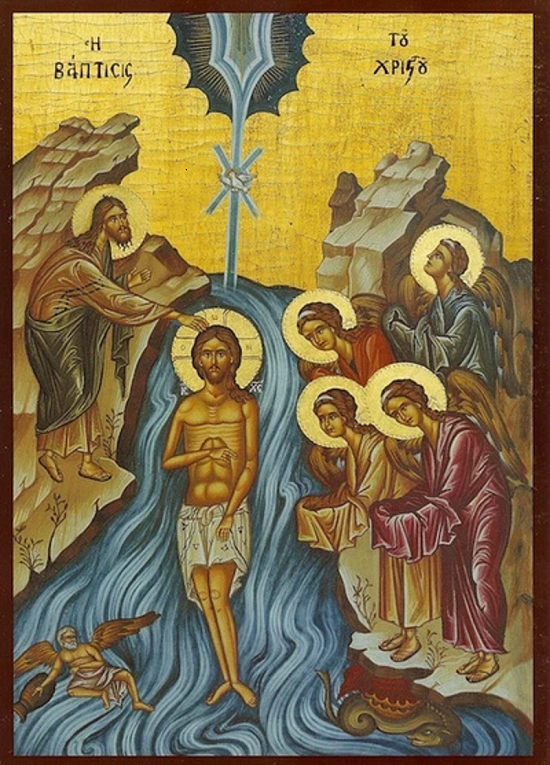The Holy Spirit Comes
Baptism Scripture Readings

Luke’s description of the baptism of Jesus is different from any of the other evangelists, and it serves a different purpose. In each of the gospels, from the earliest, Mark, through Matthew, then Luke, and, finally, John, the role of the Baptist diminishes until, in John’s Gospel, Jesus’s baptism isn’t even mentioned. Here, in Luke’s Gospel, we hear the testimony of the Baptist, but Jesus’s baptism is described in the impersonal passive voice: “After … Jesus had also been baptized …” The Baptist as agent disappears from the scene. What we see instead is Jesus at prayer, the heavens opening, the Holy Spirit descending on Jesus like a dove, and the Father’s voice claiming Jesus as his Son. In addition, the passage isn’t even clear as to whether these signs were witnessed by the bystanders, or just by Jesus himself alone.
In either case, the event was meant to point out the identity of Jesus—the Messiah who was anxiously awaited, and God’s beloved Son—and to serve as Jesus’s solemn investiture in his prophetic role as preacher, teacher, and worker of great signs. For Luke, that was the purpose of the theophanies that took place on the occasion of Jesus’s baptism. They rendered the baptism itself as of secondary importance and served to distinguish the meaning of Jesus’s baptism from the baptism of repentance that the Baptist was preaching. If we want to have a better idea of the meaning of Jesus’s baptism according to Luke, we’ll have to look at Luke’s writings in their entirety.
It may not be immediately obvious, but Luke’s work comes in two volumes. The first volume, the Gospel of Luke, traces Jesus’s life from his conception through his ministry, death, and resurrection, and ends with his glorification at the Ascension. The second volume, The Acts of the Apostles, takes up where the Gospel of Luke leaves off: at the Ascension. Immediately following the Ascension, we’re presented with Luke’s version of the descent of the Holy Spirit at Pentecost and the empowering of the Apostles to bring the good news of salvation to the world outside Israel.
I believe it’s very important to see both the continuity and the parallels within the whole of Luke’s writings. The story begins with the announcement of the birth of John the Baptist, a man “filled with the Holy Spirit even from his mother’s womb.” [Luke 1:15] At every step of the way, Luke shows us the power of the Holy Spirit at work in the world through Jesus, and then, after Pentecost, in the life and ministry of the Church. The whole story as presented by Luke is summed up in the gradual descent of God’s Holy Spirit into our world and our empowerment by the Spirit to overcome human weaknesses, ignorance, malice, sickness, and even death itself.
Jesus’s baptism is a turning point not only in Jesus’s life but in the history of God’s dealings with humankind. This is the moment when the Holy Spirit—the very Life Power of God—takes over in the life of Jesus. The work of the Messiah has thus begun. The baptism begins the work of the Spirit in and through Jesus, overcoming all obstacles and limitations within the context of the People of Israel and the children of the Covenant.
The parallel event—what we might even consider the baptism of the Body of Christ, the Church—took place at Pentecost. This is the moment when the Holy Spirit—the very Life Power of God—takes over in the life of the Church. The work of evangelization has thus begun. Pentecost begins the work of the Spirit in and through the Church, overcoming all obstacles and limitations throughout the world and for all ages, creating a new people of the covenant.
It’s all about the Holy Spirit—the very Life Power of God. Once the work of the Spirit began at Jesus’s baptism, it never ceased, never wavered, never faltered, never failed. We are heirs of the Holy Spirit that was manifest in Jesus’s baptism, given at Pentecost, and renewed in each believer now and until the end of human history. The work of the Holy Spirit from our baptism has varied not at all from what Jesus received at his. We, too, are empowered as Jesus was, as preachers, teachers, and workers of great signs by our living lives of witness to the love God has for us, for all people, and for all of his creation. We, too, are empowered to overcome all obstacles and limitations, all ignorance, malice, sickness, and even death itself through our trust in God, our loving Creator and Redeemer.
As we celebrate the Solemnity of the Baptism of Our Lord, we’re invited to recall that none of the gospel stories about Jesus are limited to him in his time and place. We are implicated in every gospel narrative. Jesus’s baptism is our baptism. His receipt of the Holy Spirit is ours, as well. May the voice from heaven speak to us as it spoke to Jesus saying, “You are my beloved daughter; you are my beloved son; with you I am well pleased.”
Get articles from H. Les Brown delivered to your email inbox
